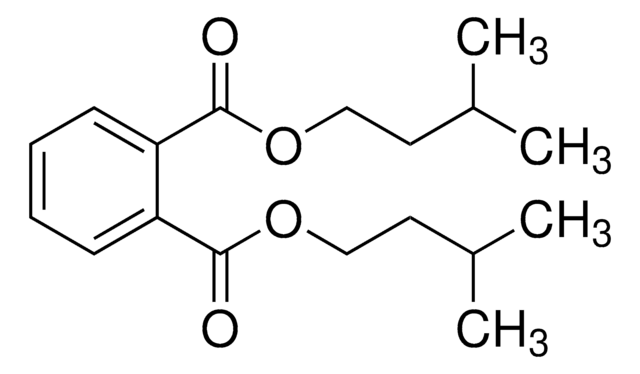49617
Dihexyl phthalate
analytical standard
Synonyme(s) :
1,2-Benzenedicarboxylic acid 1,2-dihexyl ester, Di-n-hexyl phthalate, Phthalic acid dihexyl ester
About This Item
Produits recommandés
Qualité
analytical standard
Niveau de qualité
Pureté
≥99.0% (GC)
Durée de conservation
limited shelf life, expiry date on the label
Technique(s)
HPLC: suitable
gas chromatography (GC): suitable
Indice de réfraction
n20/D 1.486-1.489
Application(s)
cleaning products
cosmetics
environmental
food and beverages
personal care
Format
neat
Température de stockage
2-8°C
Chaîne SMILES
O=C(OCCCCCC)C1=CC=CC=C1C(OCCCCCC)=O
InChI
1S/C20H30O4/c1-3-5-7-11-15-23-19(21)17-13-9-10-14-18(17)20(22)24-16-12-8-6-4-2/h9-10,13-14H,3-8,11-12,15-16H2,1-2H3
Clé InChI
KCXZNSGUUQJJTR-UHFFFAOYSA-N
Catégories apparentées
Description générale
Application
Produits recommandés
Mention d'avertissement
Danger
Mentions de danger
Conseils de prudence
Classification des risques
Repr. 1B
Code de la classe de stockage
6.1C - Combustible acute toxic Cat.3 / toxic compounds or compounds which causing chronic effects
Classe de danger pour l'eau (WGK)
WGK 3
Point d'éclair (°F)
350.6 °F
Point d'éclair (°C)
177 °C
Choose from one of the most recent versions:
Déjà en possession de ce produit ?
Retrouvez la documentation relative aux produits que vous avez récemment achetés dans la Bibliothèque de documents.
Les clients ont également consulté
Notre équipe de scientifiques dispose d'une expérience dans tous les secteurs de la recherche, notamment en sciences de la vie, science des matériaux, synthèse chimique, chromatographie, analyse et dans de nombreux autres domaines..
Contacter notre Service technique










